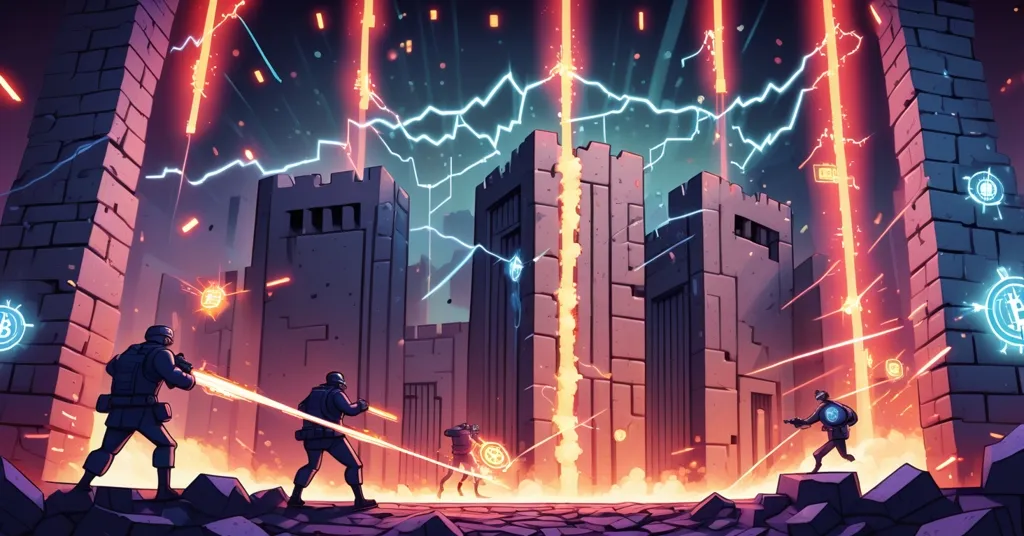U.S.-China Tech Clash: Can Blockchain Break Through Regulatory Barriers?

U.S.-China Tech Tensions: Can Blockchain Smash Through Regulatory Walls?
Apple’s push to roll out AI services in China with Alibaba has slammed into a brick wall of regulatory delays, courtesy of Beijing’s iron grip on tech. As geopolitical sparring between the U.S. and China strangles centralized innovation, could blockchain and decentralized systems offer a lifeline—not just for tech giants, but for the future of freedom in tech?
- Regulatory Stalemate: Apple’s AI partnership with Alibaba is stalled by China’s Cyberspace Administration amid U.S.-China friction.
- Centralized Weakness: Government overreach exposes the fragility of traditional tech under political pressure.
- Decentralized Hope: Blockchain could bypass bureaucratic chokeholds, offering a path to unrestricted innovation.
Apple’s Bureaucratic Nightmare in China
Apple thought they had a winning play: partner with Alibaba to launch “Apple Intelligence,” a flashy suite of AI tools tailored for Chinese iPhone users, leveraging Alibaba’s local AI models to smooth the path through China’s regulatory gauntlet. But the Cyberspace Administration of China (CAC), Beijing’s top internet watchdog, has other ideas. Despite multiple submissions for approval, Apple’s applications are collecting dust, with no clear timeline for a green light. Sources pin the blame on the intensifying U.S.-China rivalry—a messy mix of trade disputes and political posturing that’s turned tech into a geopolitical battlefield. For those not in the loop, the CAC is the gatekeeper for all things digital in China, deciding what tech gets to play in the world’s second-largest market. While over 300 homegrown AI models have sailed through approvals, U.S.-linked partnerships like this one are stuck in endless “review,” a thinly veiled jab at foreign players, as detailed in recent reports on Apple’s stalled partnership with Alibaba.
On the flip side, Apple’s getting heat from the U.S. as well. President Donald Trump has been vocal about wanting Apple to ditch Chinese manufacturing, threatening a hefty 25% tariff on devices not made on American soil. Meanwhile, the U.S. Commerce Department’s Bureau of Industry and Security, which polices export controls and flags deals that might threaten national interests, is eyeballing the Alibaba tie-up with suspicion. The result? Apple’s caught in a vice—losing ground in China’s high-end smartphone market, where its share has cratered from 70% in early 2023 to just 47% by Q1 2025, while local heavyweight Huawei surges ahead with AI-powered devices. Investors are jumpy, Apple’s stock is taking hits, and competitors like Xiaomi and Oppo are eating their lunch with AI features already live. It’s a textbook case of centralized systems buckling under political weight, with further insights available on the latest updates on Apple and Alibaba’s regulatory delays.
The Centralized Trap: Innovation Held Hostage
Let’s cut through the noise: Apple’s predicament isn’t just a corporate sob story; it’s a glaring neon sign pointing to the flaws of centralized tech ecosystems. When innovation hinges on bureaucratic whims, whether in Beijing or Washington, progress grinds to a halt. Think of centralized systems as a single, heavily guarded bridge—everyone’s forced to cross it, but if the guard says no, you’re screwed. Governments wield outsized power to throttle tech rollouts, dictate terms, and prioritize national champions over global players. China’s bias toward domestic AI models is blatant, and the U.S. isn’t innocent either, with its own agenda to curb reliance on Chinese tech. For companies like Apple, navigating this minefield means delays, lost revenue, and a constant game of political chess.
For those new to this tug-of-war, U.S.-China tensions boil down to a global showdown over tech supremacy—who sets the rules, who controls the data, and who reaps the profits. It’s a fight that’s been simmering for over a decade, with tariffs, bans, and restrictions piling up on both sides. Apple, with its deep manufacturing roots in China, is a prime target, squeezed between American demands to “bring jobs home” and Chinese policies pushing for technological self-reliance. The stakes couldn’t be higher, and the lesson is clear: when tech is tethered to centralized gatekeepers, innovation becomes a casualty of geopolitics, as explored in depth in discussions about the impact of U.S.-China tech tensions on blockchain.
Blockchain’s Promise: A Decentralized Middle Finger to Bureaucracy
Here’s where things get interesting for us in the crypto crowd. Blockchain—the tech underpinning Bitcoin and a slew of other cryptocurrencies—offers a radical alternative to this centralized mess. At its core, blockchain is a distributed ledger, a record of data or transactions spread across a network of computers with no single point of control. No overlord, no CAC, no Bureau of Industry and Security to slam on the brakes. Imagine Apple hosting AI model data on a blockchain, allowing direct, peer-to-peer sharing with users or developers. No need to beg for Beijing’s blessing—just raw, unfiltered access. It’s like swapping that guarded bridge for a fleet of small boats; anyone can cross the river without a permission slip. For a deeper dive into the fundamentals, check out this overview of blockchain technology and decentralization.
Projects already tinkering at this intersection of blockchain and AI give us a glimpse of what’s possible. Take Fetch.AI, built on Ethereum, which creates autonomous “agents”—think digital middlemen—that can trade data or services directly on a blockchain. Picture Apple using something like this to deploy AI updates to iPhones without a centralized server begging for CAC approval. Or consider Ocean Protocol, another Ethereum-based project, which acts as a decentralized data marketplace. Companies or individuals can share and monetize data without a corporate or government intermediary, akin to a farmer selling straight to buyers at a local market instead of through a supermarket chain. These aren’t just sci-fi fantasies; they’re early steps toward tech that could outmaneuver geopolitical roadblocks, as discussed in community forums about blockchain solutions for AI regulatory challenges.
The Harsh Reality: Decentralization Isn’t a Magic Fix
Before we start chanting “blockchain solves everything,” let’s pump the brakes. China’s relationship with this tech is a masterclass in how even decentralization can be leashed. While Beijing has crushed decentralized cryptocurrencies—Bitcoin mining was effectively outlawed there in 2021—they’re all-in on state-controlled blockchain projects. Initiatives like OwlChain for food traceability or BraveLog for sports event management, as documented in recent academic studies, show China’s vision of blockchain: a pretty tool, but only if it’s under government lock and key. It’s decentralization in name only, more like a caged bird than a free-flying eagle. This isn’t just theory; over 300 state-sanctioned blockchain use cases are live in China, all tightly aligned with political control. So, even if Apple pivoted to blockchain, don’t expect the CAC to throw a parade—they’d likely just shift their iron fist to the humans or hardware running the system, a perspective reinforced by expert analysis on U.S.-China tech tensions affecting blockchain projects.
Globally, the story isn’t much rosier. Governments everywhere, from authoritarian regimes to democratic ones, have a vested interest in maintaining control over tech. Blockchain might dodge some red tape, but it’s not invisible. Regulators can target exchanges, developers, or even energy supplies for miners, as we’ve seen in past crackdowns. And let’s be real—blockchain tech itself isn’t ready to handle the massive data loads of something like Apple’s AI at global scale. Ethereum, for instance, still wrestles with transaction costs and speed, though layer-2 solutions are chipping away at those issues. The point is, while decentralization offers a tantalizing escape route, it’s more of a dirt path than a superhighway right now. We’re building toward a freer future, but it’s going to be a grind, with ongoing debates about whether blockchain can bypass regulatory hurdles like those Apple faces.
Bitcoin and Crypto’s Edge in a Geopolitical Mess
Amid all this chaos, Bitcoin stands as the ultimate “screw you” to centralized control. Unlike Apple, which is bleeding market share and stock value over regulatory spats and tariff threats, Bitcoin doesn’t give a damn about borders or bureaucrats. It’s a censorship-resistant store of value, a digital gold that no government can slap a 25% tax on for not being “made in the USA.” When tech giants are scrambling to appease two superpowers, Bitcoin just keeps chugging along, a financial lifeboat in a sea of geopolitical bullshit. For us Bitcoin maximalists, this is the hill to die on—true sovereignty in a world hell-bent on control.
That said, I’m not blind to the broader crypto landscape. Altcoins and other blockchains like Ethereum are carving out spaces Bitcoin doesn’t touch. Ethereum’s smart contracts—self-executing agreements coded on the blockchain—power decentralized finance (DeFi) and protocols like Fetch.AI, offering tools for trustless partnerships that could help tech firms dodge government interference. These niches matter; Bitcoin won’t solve Apple’s AI data problem, but an Ethereum-based solution just might. It’s a team effort in this financial revolution—Bitcoin as the unassailable reserve, altcoins as the experimental labs pushing boundaries. If Tim Cook can’t navigate Beijing’s maze, maybe it’s time to stack some sats and fund a decentralized workaround, especially considering the ongoing regulatory issues Apple faces in China. Hell, it’s cheaper than lobbying!
Pushing for a Free, Decentralized Future
Zooming out, Apple’s regulatory quagmire with Alibaba is a microcosm of a bigger war over who owns tech in the 21st century. Centralized systems are cracking under the strain of politics, with innovation held hostage by gatekeepers on both sides of the Pacific. Blockchain and decentralized tech offer a rebellious counterpunch—a chance to build systems that don’t bow to bureaucrats, championing the freedom and privacy we crave. Yet, we’ve got to stay grounded. China’s faux-decentralization and the raw limits of blockchain tech remind us this isn’t a fairy tale. Progress will be messy, fought tooth and nail against state power and technical growing pains.
For us in the crypto community, this is a call to arms. Developers, hodlers, miners—we’re the ones who can accelerate this shift, building and advocating for tools that outrun bureaucracy. Bitcoin remains our bedrock, the defiance of centralized nonsense, while altcoins experiment with solutions to tomorrow’s problems. As tech giants stumble under political weight, let’s keep smashing the old guard, exposing their flaws, and crafting a future where innovation doesn’t need a visa. Freedom waits for no one, and we’re not asking permission.
Key Questions and Takeaways
- How do U.S.-China tech tensions impact blockchain development?
They breed uncertainty for cross-border tech projects, amplifying the need for decentralized systems that can function outside national oversight. - Can blockchain bypass regulatory hurdles like those facing Apple?
To a degree—blockchain enables peer-to-peer data and tech solutions, but governments can still crack down on users or infrastructure, as China’s policies prove. - Why is Bitcoin relevant in a geopolitically tense tech market?
Bitcoin stands as a censorship-resistant asset, immune to tariffs or tech disputes, offering a financial haven while companies like Apple flounder. - What role do altcoins play in tech innovation under regulatory pressure?
Platforms like Ethereum drive AI and data protocols such as Fetch.AI, tackling niches Bitcoin skips, and providing decentralized options for tech firms caught in red tape. - How can the crypto community accelerate decentralized tech adoption?
By building open-source tools, advocating for privacy-first policies, and supporting projects that challenge centralized control, we can push disruption faster.



